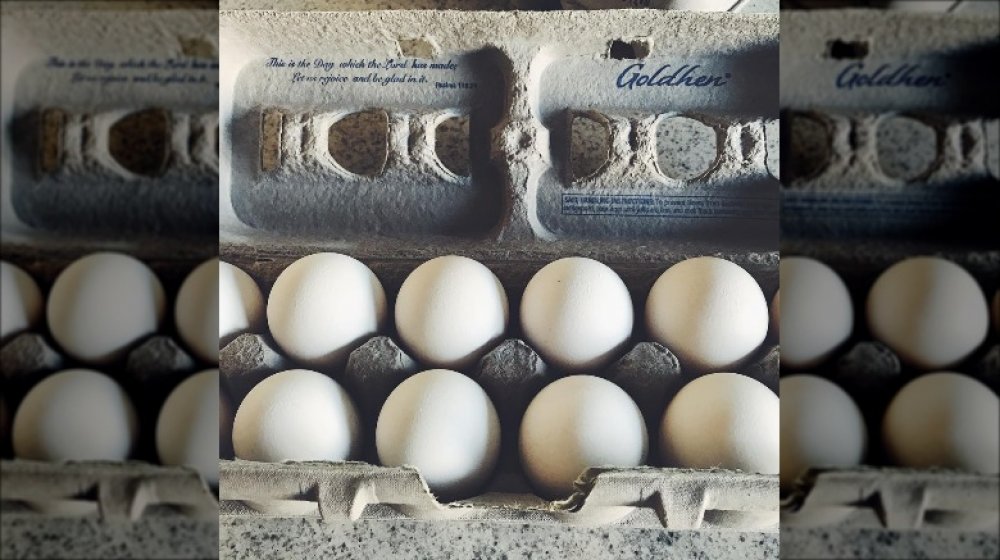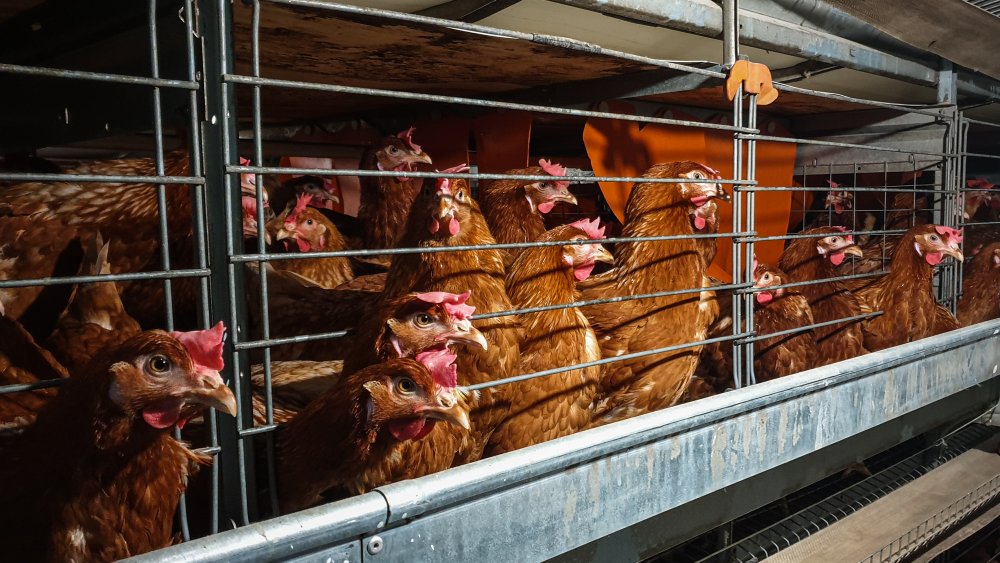You Should Never Buy Eggs From Aldi. Here's Why
Next time you're looking for eggs, you might want to skip sourcing them from everyone's favorite standby bargain grocer — Aldi. Now, keep in mind that we're not talking about Aldi's prosecco-infused chocolate eggs that came out around Easter 2020 (via Extra). Those are heavenly. And don't even get us started on its Game of Thrones-inspired egg (via Tyla). That's nothing short of godly.
We're talking about the hen-laid carton eggs that you buy on a weekly basis for your Sunday morning breakfast scrambles. Basically, even though Aldi is great for almost everything else, it's not a great idea to buy your eggs from Aldi these days — at least until 2025. Why? By then, Aldi has committed to only selling eggs laid by hens in cage-free facilities. Good on them. That's no small thing, especially considering that, as of 2015, around 97 percent of all egg-laying hens in the U.S. are raised in battery cages, with less space to move than a piece of standard notebook paper (via Vox). By 2025, Aldi will be leading the way in the United States towards more humane food-sourcing policies.
But until 2025? If you're going to buy Aldi, buy organic. Aldi's cheaper eggs are branded Goldhen, which are sourced from Rose Acre Farms, one of the country's largest egg suppliers (Aldi Reviewer and Dun & Bradstreet). Rose Acre Farms, unfortunately, does not have the best rap sheet.
The questionable history of Rose Acre Farms
As Aldi Reviewer will tell you, even the cheaper eggs you'll find at Aldi are certified as "raised humanely." But what does that label really mean when it comes to the lives of the hens who lay them?
In 2019 the company went on public record trying to push back on California state regulations safeguarding animal rights. Among other things, they lobbied to include ramps in the calculation of the amount "floor space" necessary to ensure that hens are not "confined in a cruel manner," and to limit the definition of an "egg-laying hen" to "sexually mature" chickens and not "any female domesticated chicken."
In 2018, the FDA investigated Rose Acre Farms and found dirty chicken houses, rodent infestations, and "condensation dripping on crack detectors, egg graders, and other production equipment" (via FDA and Food Safety News). Their investigation uncovered hauntingly similar conditions to what undercover investigators from the Humane Society found eight years prior: hens in filthy conditions unable to reach food, suffering from broken bones, prolapsed uteruses, and nestled in among rotting corpses (via Animal Legal and Historical Center and ABC News). That particular undercover investigation led to a lawsuit, in which plaintiffs also called the company out for misleading imagery on its packaging and marketing "free-roaming" eggs, a label that doesn't even really apply to eggs.
More troubling still is that the unsanitary conditions that Rose Acre Farms has come under consistent scrutiny for in the last decade are not solely an animal rights issue. They could directly affect your health.
Can eating Aldi's Goldhen eggs make you sick?
The 2018 FDA investigation? It wasn't random. The FDA inspected Rose Acre Farms due to a salmonella outbreak linked to the company's shell eggs. Before we go any further, if you bought Aldi eggs in 2018, you can breathe. The salmonella outbreak did not, apparently, infect eggs distributed to Aldi, which has probably as much to do with luck as anything else.
The CliffNotes are as follows. The 2018 outbreak infected 45 people who experienced diarrhea, fever, and abdominal cramps and led to 11 hospitalizations in 10 states. Among those hospitalized was Judy Roberts, a 70-year-old, diabetic woman from Florida who filed a lawsuit against the company after getting so sick she could not get out of bed (via the Indy Star).
In hindsight, the outbreak is hardly surprising. In 2012, ABC News reported that eggs from cage-confined hens were 7.77 times more likely to harbor salmonella bacteria than non-caged hens. While the FDA investigation into Rose Acre Farms led the company to voluntarily recall over 206 million eggs it had distributed domestically, the same salmonella-infected eggs were shipped to the Bahamas, Haiti, Aruba, the Cayman Islands, St. Martin, St. Barts, and Turks Caicos, where the FDA has no authority to intervene (via FDA and Forbes).
What's the moral of the story? Stay away from Aldi's Goldhen eggs just to be on the safe side, and until 2025, maybe opt for their Simply Nature, Cage-Free Organic eggs. These are certified humane according to Humane Farm Animal Care and inspected annually by the organization.


